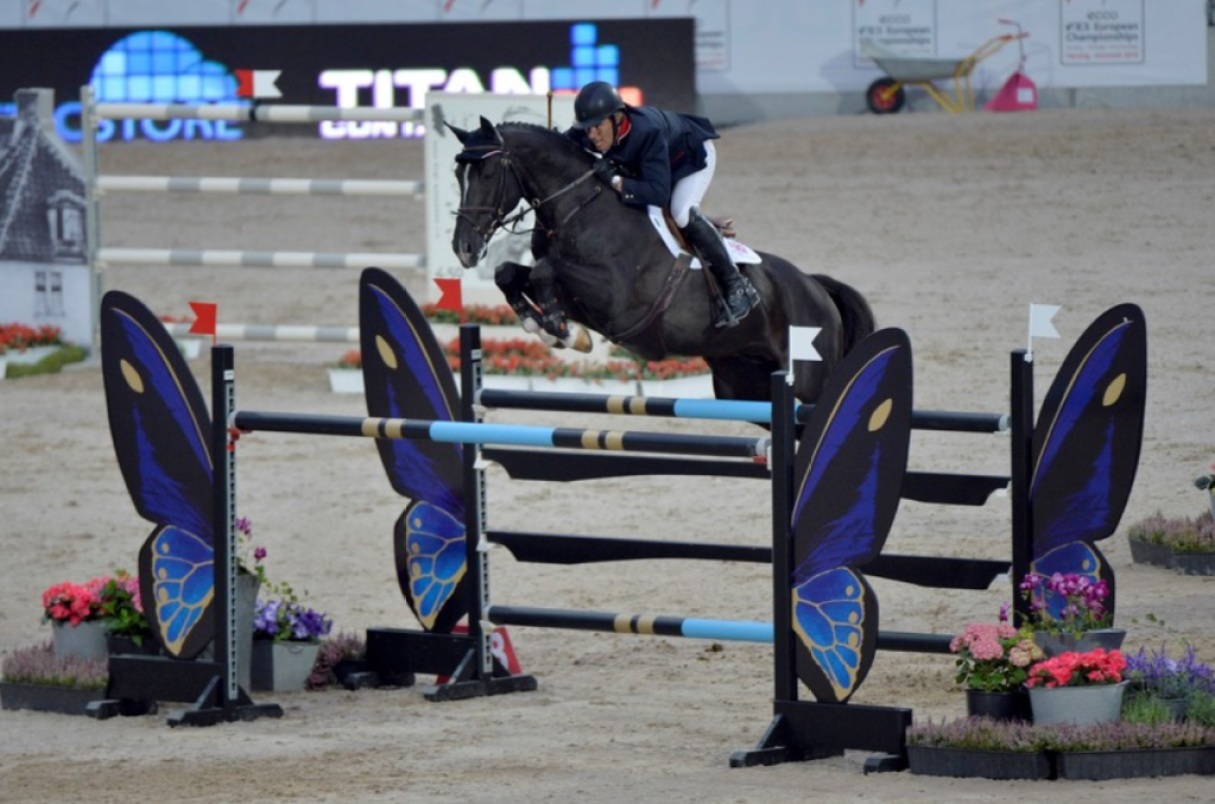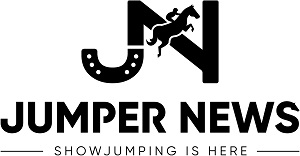
What’s your earliest equestrian memory?
My earliest equestrian memory is riding a tiny little black Shetland pony when I was very young, probably about four or five. I was lucky enough to be brought up on a farm in a place called Challock just above Ashford in Kent. As a farmer’s son, we were always around animals, so I was brought up around ponies and horses. Generally, I had a very charming upbringing being in the countryside with animals.
What has been the proudest moment of your career so far?
I think representing your country at team events have been great. Team gold at the European Championships in Herning [in 2013] was a big moment, as well as the Hickstead Derby. As a child, I used to watch the Hickstead Derby, so when I won it, it was a big deal for me. I’ve been lucky enough to have been in many Nations Cup teams, which will be amongst my top proudest moments.
The partnership between horse and rider is clearly very important – is that something you’re looking for when you sell to new owners?
As a stud, it’s very important to see the horses that we breed go on, which is always difficult, because sometimes the best riders don’t have the most money. It’s important that we try to find a balance. There’s no point in selling the top Grands Prix horses to an amateur; it’s vital to try and match the whole thing, as we are trying to get the most exposure we can out of a good horse, and to be able to do that, they need to compete with good riders.
Can you share some behind the scenes insights into what it’s like at The Billy Stud in terms of your setup?
I think we are in an ideal scenario. My business partner, Donal Barnwell, does all the foaling and everything up until the horses are three year olds. Then they come to me and we break them. We assess performance, we assess their jumping and their potential, and we try to market and produce them to the best of their ability. We also work out the best time to market specific horses.
On average, over the last few years we’ve had 100 pregnancies per year, with a lot of them done through embryo transfers where you have about a 10-15 per cent absorption rate. We will have 80-85 foals and end up with 70-80 three year olds that come to us in the spring. We have seven or eight riders, including Pippa and me. We have four arenas including an indoor school and a couple of grass arenas, so we can do quite a lot at home before we have to spend money to take them to shows. We’ve got a couple of different courses and jumps, so we can educate the horses well at home.
What is your main ambition with your career and breeding horses?
Riding wise, I’m coming towards the end of my career. It would have been lovely to have got to the Olympics this year with a horse that we bred. I only jump home-bred horses, but to get in the top 30 in the rankings on home-bred horses is probably something that no one else has achieved. I would say that I’m the sole rider that exclusively rides their own home-bred horses, so that’s an achievement I’m very proud of. It would have been lovely to ride a home-bred in the Olympics, but you never know, hopefully I’ll have one more opportunity. I get as much pleasure watching somebody else ride, so hopefully, we can breed good enough horses to place them with the right riders, to see them competing for medals at the Olympics and at other championships in the future.
Are there any of your home-bred horses at the moment that are with other top riders that are really excelling?
Yes, there are several in Europe and America. Pippa, my wife, rode a home-bred in the eventing at the Rio Olympics. We’ve had horses that we’ve bred compete in all sorts of championships, but I don’t think we’ve got anything with us to throw at the Olympics this year.

Which home-bred horses are you most proud of?
I think Billy Congo, who won team gold at Herning. I think he was the leading stallion in the GCT for money winnings – one year he won £300,000 on the tour and I won a 5* Grand Prix with him. I also won the Hickstead Derby with his son, Billy Buckingham.
Aside from breeding, what are your other ambitions and aspirations?
I believe that what we’re currently doing, we can always do it better. I don’t want to get any bigger, but we can definitely do things better and constantly improve. We’re learning all the time and I wish we could have had the horses and the knowledge that we have now 20 years ago.
Are you mentoring anyone?
Yes, both Pippa and I are mentoring Joe Stockdale, the son of the late Tim Stockdale. I give a hand to Joe, and he’s had some great moments this year, jumping double clears in the Nations Cup. It gives me a lot of pleasure watching him compete.
Great Britain has some very talented young riders coming through, including Jack Whitaker. There was a time where I jumped championships with Nick Skelton, John and Michael Whitaker, and I was the young one out of the team. I felt young then, but now with Nick [Skelton] retiring, I am starting to feel old when I go to shows. But it’s really nice to see those kids with their parents. Teamwork is a big part of show jumping and definitely something I’ve enjoyed over the years.
How positive do you believe the Rolex Grand Slam is for the sport of show jumping?
Scott Brash won the Grand Slam, which was fantastic. To be able to win it is a great achievement, particularly when riders are able to manage their horses so well. There are so many different scenarios that make it difficult, so for it all to come together is an incredible feat, particularly to win those top competitions against the best riders and horses in the world. To pull that off in those selected events is incredibly impressive. The horse and the rider have to be at the very top of their game, so to be able to peak right at that moment is a massive accomplishment.
The Rolex Grand Slam has incentivised a lot of riders, but it’s very individual. It brings attention to those top competitions. I think the Rolex Grand Slam is very good for show jumping, and it’s great that those four fantastic venues are part of it. Those shows have always been the most difficult places to win at, and the fact that there’s such a big prize pot at the end of it obviously makes it something that everybody wants to achieve.
Have you got a favourite out of those four Majors?
I think Aachen and Calgary are very special. I’ve always been more of an outdoor arena kind of person, and I do think the balance of the Rolex Grand Slam – with Geneva and The Dutch Masters being indoor – makes it a whole lot more enjoyable. Personally, I’ve always had more success outdoors, and enjoyed it more, so those would be the two for me.
Who’s been your biggest inspiration throughout your life and your career?
I think John Whitaker has always been someone I’ve looked up to. Seeing John riding and the way he is with his horses has always impressed me, he’s always been a great horseman.
What is the best piece of advice you’ve ever been given?
John [Whitaker] once told me that if the basics are right, then the rest comes together. A lot of the time we overlook the simple things.
Source: Press Release from Rolex Grand Slam of Show Jumping
Photo: © Eli Birch Boots and Hooves Photography
Categories: English, Interviews, News





